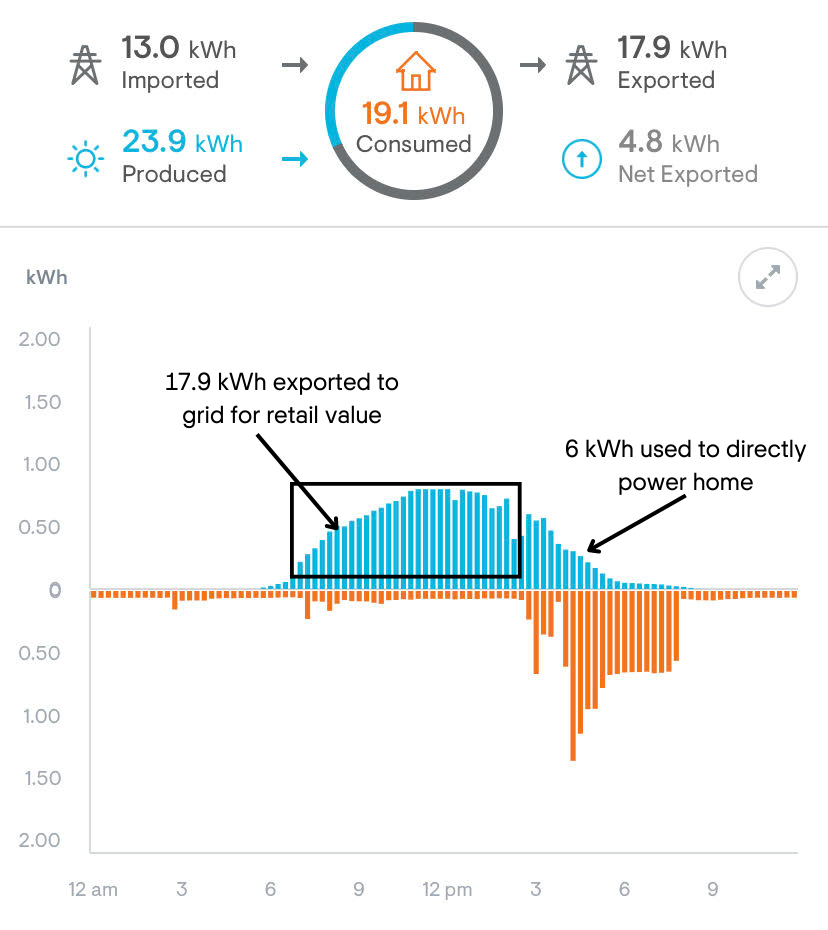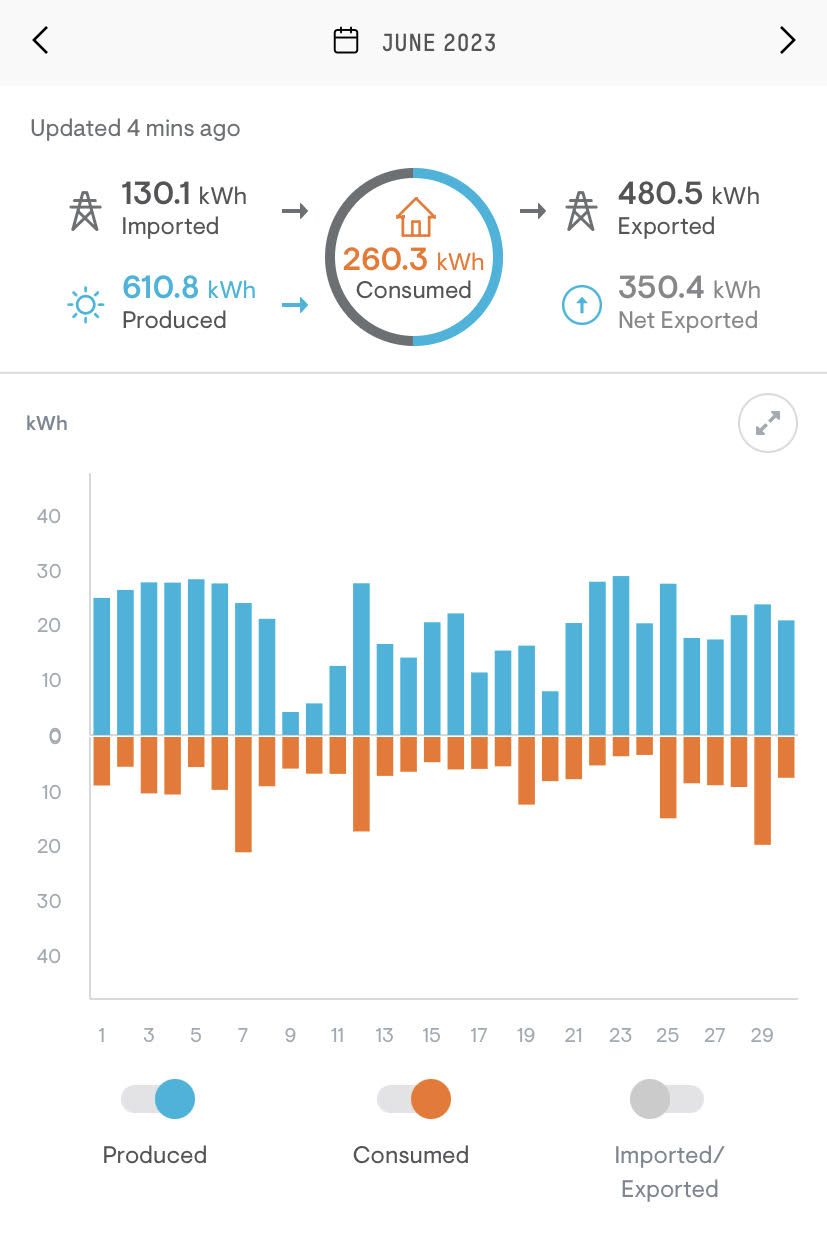Understanding Your Electric Bill Before and After Going Solar
Energy cost savings is often the primary reason homeowners invest in solar panels. But what exactly happens to your electric bill before and after installing solar panels?
In this article, we’ll explain exactly how solar panels lower your electricity bill so you don’t end up saying, “I have solar panels. Now what?”
Connect with an Energy Advisor to explore your savings potential.
Do you still have an electric bill with solar panels?
Yes, you’ll still have an electric bill before and after your solar panels are installed and producing clean energy. However, the balance due on your monthly bills will be much lower – or even negative – because your solar production replaces and offsets the cost of buying grid electricity from your utility.
Solar panels reduce the amount due on your electricity bill in two ways.
First, solar production is used to directly power your home, which reduces the amount of electricity you purchase from the utility grid. So, if you use 19 kWh of electricity in a day and your solar system directly powers 6 kWh of your usage, then you only need to purchase 13 kWh from the grid.

Second, under net metering, excess solar production can be pushed (or “exported”) onto the electricity grid in exchange for credit. This credit is then used to offset the cost of the grid electricity you purchase from the grid when your panels aren’t producing electricity.
So, let’s say your solar system produces 24 kWh of electricity during the day, as the graph above shows.
- 6 kWh is used to directly power the electrical systems in your home
- The other 18 kWh is pushed onto the grid for net metering credit that more than offsets the cost of the of the 13 kWh of electricity you pull from the grid at night
The easy way to picture this is that importing grid electricity spins your meter forwards while exporting solar electricity to the grid spins your electricity meter backwards. (In fact, that’s quite literally how it works!).
So, you’ll still have a utility bill after getting solar panels, but you will only be charged for the minimal amount of grid electricity your panels don’t provide or offset.
Will solar panels pay for all my electricity?
Solar systems can be – and often are – designed to produce 100% of household electricity consumption and essentially replace your utility electric bill with a lower, more stable payment on the solar system.
At this point, it’s important to distinguish between a solar bill vs electricity bill.
Your solar bill is the monthly payments you make on the solar system. If you choose to finance the system, your solar bill is your monthly loan payments. If you pay cash, your “solar bill” is essentially the net cost of your system spread out over its lifetime. So, if you pay $17,500 for a solar system that’s warrantied for 25 years (300 months), you are essentially paying $58 per month for the electricity it produces.
Meanwhile, your electricity bill is the monthly payments you make to your utility for electricity service.
The goal of most home solar systems is to reduce the electricity bill as much as possible so you are only paying for your solar system. There are several advantages of paying for your solar equipment instead of an electricity bill.
- Solar loan payments are the same every month, regardless of your consumption
- They can be lower than your current average electric bill and thus provide Day 1 savings
- Unlike utility rates, solar loan payments do not increase over time
- You are investing in an owned asset that increases your home value, instead of buying electricity one kilowatt-hour at a time
At the end of the day, home solar gives you control over where your electricity comes from and how you pay for it – which is something you won’t get from a utility company.
How much will my electric bill be with solar panels?
Your electricity bill with solar panels depends on a few factors, including the size of your system, electricity consumption, net metering policy, and the time of year. In many cases, solar systems can be designed to produce 100% bill offset so the homeowner is only paying for solar electricity or utility electricity – and not both.
How to calculate your power bill with solar
With 1:1 net metering (where the value of excess solar electricity is equal to the price you pay for grid electricity), calculating your monthly electricity bill is fairly simple.
Monthly electric bill = Cost of grid electricity imports – value of solar exports
So, let’s say you have 1:1 net metering, a solar system sized to produce 100% of your average electricity consumption, and a utility rate of 17 cents per kWh. For the month of June, your consumption and production might look something like the graphic below:

June 2023 solar production and household consumption for the author’s household and solar system.
You consume 260 kWh of electricity throughout the month, which would cost ~$44 at 17 cents per kWh. However, your solar system provides around half of that electricity, so you only buy (aka “import”) 130 kWh from the grid worth $22. That’s the cost of your grid imports.
Meanwhile, since June is a very sunny and mild month, your solar system produces way more electricity than your home uses and exports 480 kWh to the grid. Under 1:1 net metering, these exports are worth the same as your retail rate for imports, and at 17 cents per kWh are worth $82. That’s the value of your solar exports.
To calculate your monthly bill, subtract the value of your exports from the cost of the imports, as shown below:
$22 for grid imports – $82 for solar exports = -$60 electricity bill
So instead of a $44 electric bill before solar panels, you now have a -$60 bill with solar panels — a $104 swing.
Electric bill before and after solar panels:
| Before solar | After solar | |
| Monthly Consumption | 260 kWh | 260 kWh |
| Imported from grid | 260 kWh | 130 kWh |
| Exported to grid | N/A | 480 kWh |
| Net consumption | 260 kWh | -350 kWh |
| Utility rate | 17 cents per kWh | 17 cents per kWh |
| Monthly bill | $44.20 | -$59.50 |
Now, there are few things to keep in mind.
Annual net metering cycles
Most utilities have an annual billing cycle in which net metering credits roll over from month to month. So, don’t expect a $60 check in place of your bill. Instead, you’ll use your $60 in net metering credit (and whatever else you build up during the spring and summer) to offset fall and winter bills when your system produces less electricity than your home uses.
At the end of the year, you’ll have a “true-up” period to reconcile the difference between your imports and exports.
Non-bypassable or fixed charges
Many utilities have “non-bypassable charges” or fixed fees that can’t be offset by solar. These are typically around $15-20 per month that you pay for whether you have solar or not.
Not all utilities offer flat rates and 1:1 net metering
Calculating your power bill with solar isn’t this simple if your utility has variable time-of-use (TOU) rates and/or a less favorable net metering policy.
For example, under California’s NEM 3.0 solar billing policy, solar exports are worth, on average, around 75% less than the price of importing electricity. So, a system sized to produce 100% of your electricity consumption only provides ~50% bill offset.
In this case, the recommended bill-savings strategy is to use battery storage to avoid importing and exporting with the grid altogether.
The bottom line
Electricity is an essential cost of living that people are going to pay for – one way or another – throughout their lives. With home solar, many homeowners can essentially replace their utility electric bill with the payments on their panels.
While homeowners with grid-tied solar systems receive an electric bill before and after installing solar panels, the bill will be substantially lower – if not zero.
On solar.com, we design systems for maximum bill reduction and energy cost savings every single day. Connect with an Energy Advisor to see how much you can reduce your electricity bill!








